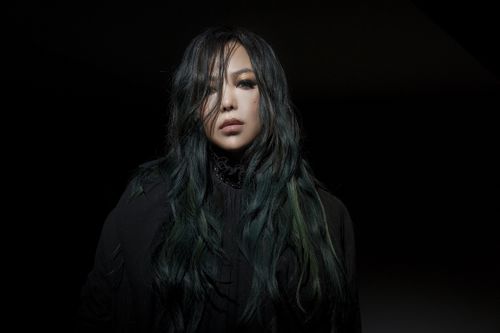A-Mei: Difference between revisions
mNo edit summary |
No edit summary |
||
| (56 intermediate revisions by 7 users not shown) | |||
| Line 1: | Line 1: | ||
'''A-Mei''' is | [[Image:ameistorythiefpromo.jpeg|thumb|500px|A-Mei promoting ''[[Tou Gushi De Ren|Tōu Gùshì De Rén]]'' (2017)]] | ||
<div align="justify"> | |||
'''A-Mei''' (張惠妹) is an aboriginal Taiwanese [[Mandopop]] singer currently under [[Gold Typhoon]]. She is best known for her ballads and for helping push the exposure of Taiwanese aborigines in the music industry. A-Mei debuted in 1996 under [[Forward Music]] with the album ''[[Zimei|Zǐmèi]]'' and found overnight success. Her second album, ''[[Bad Boy (A-Mei)|Bad Boy]]'', became the second best selling album in Taiwan with over 1.3 millions copies sold and scored numerous hits such as "[[Ting Hai|Tīng Hǎi]]" and the title track. In 2000, A-Mei switched to [[Warner Music Taiwan]]. Initially having continued success, a cross-straits controversy caused her to experience a decline from 2004 until her comeback in 2006 with the album ''[[Wo Yao Kuai Le|Wǒ Yào Kuài Lè?]]''. In 2009, she released an album under her Puyuma aboriginal name, ''Amit'', which featured a more prominent rock sound. | |||
==< | She is the older sister of singer and actress [[Saya Chang]]. | ||
</div> | |||
== Profile == | |||
*'''Name:''' A-Mei | |||
*'''Real name:''' Chang Hui-mei / Zhāng Huìmèi (張惠妹) | |||
*'''Birth date:''' August 9, 1972 | |||
*'''Birth place:''' [[Taitung|Taitung]], [[Taiwan|Taiwan]] | |||
*'''Height:''' 158cm | |||
*'''Weight:''' 48kg | |||
*'''Blood Type:''' O | |||
*'''Labels:''' | |||
** [[Forward Music]] <small>(1996-2001)</small> | |||
** [[Warner Music Taiwan]] <small>(2001-2007)</small> | |||
** [[Gold Typhoon]] <small>(2007-Present)</small> | |||
==Information== | |||
== | ===Forward Music - Debut And Success=== | ||
A-Mei debuted in 1996 after participating in a single with mentor and producer, [[Chang Yusheng]] and singing the theme song to the Taiwan Radio UFO Station. Not long after she released her debut album, ''[[Zimei|Zǐmèi]]'', which was a massive hit and launched A-Mei to the top of the charts. Popular singles included the ballads "[[Yuanlai Ni Shenme Dou Buyao|Yuánlái Nǐ Shénme Dōu Bùyào]]" and "[[Jietuo|Jiětuō]]" as well as the title track, all of which have become classics in Mandopop. Less than a year after her debut, A-Mei released her second album, ''[[Bad Boy (A-Mei)|Bad Boy]]'', which was even more popular. The album's singles "[[Ting Hai|Tīng Hǎi]]", "[[Bad Boy (song)|Bad Boy]]" and "[[Ku Bu Chulai|Kū Bù Chūlái]]" all became massive hits. Not long after the album was released, her producer [[Chang Yusheng]], died in a serious traffic accident. She ended the year with the release of ''[[A*Mei Live in Concert 1998 Prelude|A*Mei LIVE in Concert 1998 Prelude]]'', a collection of songs that were to be performed in her 1998 tour. | |||
A-Mei's third album would be released after a tour around Asia. ''[[Qianshou|Qiānshǒu]]'' was another big success for the young artist, although fans and critics had begun to worry about the declining quality of her voice. In 1999, she followed up her third album with the release of a single. "[[Ganjue (Feel a*mei)|Gǎnjué (Feel a*mei)]]" included the song "[[Gei Wo Ganjue|Gěi Wǒ Gǎnjué]]", which was used to help advertise Sprite. Only a few months later A-Mei released her fourth studio album, ''[[Wo Keyi Bao Ni Ma? Airen|Wǒ Kěyǐ Bào Nǐ Ma? Àirén]]''. The album topped charts and also showed off her Japanese language skills with the song "[[Hao Xiang Jian Ni|Hǎo Xiǎng Jiàn Nǐ]]". She ended the year with her second Asia tour. | |||
Before her fifth and final album under [[Forward Music]] was released, A-Mei was involved in a cross-straits controversy due to singing the R.O.C national anthem at the presidential inauguration of Chen Shui Bian in early 2000. The government in China banned her from visiting and performing in the country, which pushed endorsements to cut her off. A-Mei soon took a break and then released ''[[Buguyiqie|Bùgùyīqiè]]'' in December. Her last release under [[Forward Music]] would come in 2001 in the form of a compilation, which included her biggest hits released under the label. | |||
== | ===Warner Music - Continued Success, Decline And Comeback=== | ||
In early 2001, A-Mei switched from Forward Music to Warner Music. Later that year, she returned to the charts with the album ''[[Zhenshi|Zhēnshí]]''. It proved to be another hit for the singer with its popular ballad and pop singles as well as numerous awards won. The album also included the Mandarin rendition of the theme song to the movie [http://en.wikipedia.org/wiki/Pearl_Harbor_%28film%29 Pearl Harbor]. The next year, the singer was included in a special issue of Time magazine, which included an interview discussing her music career. Not long after, she released her second Warner Music album, ''[[Fashao|Fāshāo]]''. Due to the popularity of the album, A-Mei embarked on a tour around Asia shortly after its release. Her 2003 album, ''[[Yonggan (A-Mei)|Yǒnggǎn]]'', was met with the same response. She held numerous concerts around Taiwan to celebrate its release. | |||
In early 2004, A-Mei was yet again under fire by the cross-straits controversies. This led to some concerts having to be canceled due to the high amount of tension developed between the political figures on both sides, although she did perform overseas a few months later when things cooled down. She then released her ninth album, ''[[Yexu Mingtian|Yěxǔ Míngtiān]]''. While it performed well at first, it fell off the charts quickly due to its sound, which was different from the standard Mandarin pop sound at that time. Despite the album under-performing, A-Mei became the ambassador for the Tourism Bureau of Taiwan. | |||
2005 was met without an album release, but with much activity from the singer. She traveled to numerous countries like the U.S.A and Sudan for schooling as well as charities. She also became the representative of Mass Culture and Entertainment in Taiwan due to her participation in a discovery channel show. In early 2006, she finally returned to the music scene with the album, ''[[Wo Yao Kuai Le|Wǒ Yào Kuài Lè?]]''. Unlike her past release, this one was received positively and brought A-Mei back to the top of the charts. The title track became one of the biggest hits of the year. This studio album would be the last released under Warner Music as A-Mei signed a three-year contract with EMI Capitol in early 2007. | |||
===EMI Capitol - STAR and an Alter Ego=== | |||
In summer 2007, A-Mei released ''[[Star (A-Mei)|STAR]]''. Like her last album, this one was met with positive reviews and became a top seller in Taiwan as well as other countries in Asia. It boasted numerous hits like "[[Yongyuan De Kuai Le|Yǒngyuǎn De Kuài Lè]]", "[[Ruguo Ni Ye Tingshuo|Rúguǒ Nǐ Yě Tīng Shuō]]" and a duet with then rising star, [[Jam Hsiao]]. Due to the albums success, a tour was then embarked only a few months after its release. While 2007 was an active year for the singer, A-Mei cooled things down in 2008 with only a few live performances sprouting between her tour dates. | |||
A-Mei returned in 2009 with an even bigger impact. In June, she released her first album under her native name "AMIT". Unlike past albums, which focused on her ballads and upbeat pop songs, A-Mei ventured into rock. Despite its differences in genres, the album proved to be a major success and peaked at #1 for three weeks on the G-Music charts. | |||
==Discography== | |||
[[Image:ameibrave.jpg|thumb|215px|A-Mei promoting ''[[Yonggan (A-Mei)|Yǒnggǎn]]'' (2003)]] | |||
[[Image:ameiruwatchingpromo.jpg|thumb|215px|A-Mei promoting ''[[i Zai Kan Wo Ma?|Nǐ Zài Kàn Wǒ Ma?]]'' (2009)]] | |||
=== Albums === | |||
* [1996.12.13] [[Zimei|Zǐmèi]] (姊妹; ''Sisters'') | |||
* [1997.10.07] [[Bad Boy (A-Mei)|Bad Boy]] | |||
* [1998.10.03] [[Qianshou|Qiānshǒu]] (牽手; ''Holding Hands'') | |||
* [1999.06.08] [[Wo Keyi Bao Ni Ma? Airen|Wǒ Kěyǐ Bào Nǐ Ma? Àirén]] (我可以抱你嗎?愛人; ''Can I Hold You? Lover'') | |||
* [2000.12.05] [[Buguyiqie|Bùgùyīqiè]] (不顧一切; ''Regardless'') | |||
* [2001.10.26] [[Zhenshi|Zhēnshí]] (真實; ''Truth'') | |||
* [2002.08.30] [[Fashao|Fāshāo]] (發燒; ''Fever'') | |||
* [2003.06.27] [[Yonggan (A-Mei)|Yǒnggǎn]] (勇敢; ''Brave'') | |||
* [2004.09.21] [[Yexu Mingtian|Yěxǔ Míngtiān]] (也許明天; ''Maybe Tomorrow'') | |||
* [2006.02.17] [[Wo Yao Kuai Le|Wǒ Yào Kuài Lè?]] (我要快樂?; ''I Want Happiness?'') | |||
* [2007.08.03] [[Star (A-Mei)|STAR]] | |||
* [2009.06.26] [[Amit (album)|Amit]] (阿密特) <small>('''Amit''')</small> | |||
* [2011.04.23] [[Ni Zai Kan Wo Ma?|Nǐ Zài Kàn Wǒ Ma?]] (你在看我嗎?; ''R U Watching?'') | |||
* [2014.07.02] [[Pianzhi Mian|Piānzhí Miàn]] (偏執面; ''Faces of Paranoia'') | |||
* [2015.04.04] [[Amit2|AMIT2]] (阿密特2) <small>('''Amit''')</small> | |||
* [2017.12.12] [[Tou Gushi De Ren|Tōu Gùshì De Rén]] (偷故事的人; ''Story Thief'') | |||
===Compilation Albums=== | |||
* [1999.12.18] [[Mei Li Xinshiji|Mèi Lì Xīn Shìjì]] (妹力新世紀; ''A-Mei's New Century'') | |||
* [2001.09.07] [[Lucheng|Lǚchéng]] (旅程; ''Journey'') | |||
* [2002.10.11] [[Mei Li Zui Jingxuan|Mèi Lì Zuì Jīngxuǎn]] (妹力最精選; ''A-Mei's Most Chosen'') | |||
* [2004.04.02] [[The Original]] | |||
* [2007.02.09] [[Ai De Liliang (The Power of Love 1996-2006)|Ài De Lìliàng (The Power of Love 1996-2006)]] (愛的力量 (The Power of Love 1996-2006); ''The Power of Love'') | |||
* [2009.01.21] [[2her]] | |||
* [2011.12.23] [[Acoustic Best HQCD|Acoustic Best HQCD]] | |||
* [2014.04.01] [[Wo Zui Qin'ai De Zhang Huimei-Gei Ziji De Jingxuan|Wǒ Zuì Qīn'ài De Zhāng Huìmèi-Gěi Zìjǐ De Jīngxuǎn]] (我最親愛的張惠妹-給自己的精選; ''My Dearest A-Mei'') | |||
===Live Albums=== | |||
* [1997.10.03] [[Mei Li Si She|Mèi Lì Sì Shè]] (妹力四射; ''A-Mei's Radiance'') | |||
* [2000.04.14] [[Gesheng Mei Ying (Time to Say Goodbye A-Mei Hong Kong Live)|Gēshēng Mèi Yǐng (Time to say goodbye A-Mei Hong Kong Live)]] (歌聲妹影; ''Singing A-Mei Video'') | |||
* [2003.01.17] [[A Ji Yule|A Jí Yúlè]] (A級娛樂; ''A Level Entertainment'') | |||
* [2013.10.31] [[AMeiZING Live Shijie Xunhui Yanchanghui|AMeiZING Live Shìjiè Xúnhuí Yǎnchànghuì]] (AMeiZING Live世界巡迴演唱會; ''AMeiZING Live World Tour'') | |||
===Singles=== | |||
* [1999.04.20] [[Ganjue (Feel a*mei)|Gǎnjué (Feel a*mei)]] (感覺 (Feel a*mei); ''Feel'') | |||
===Digital Singles=== | |||
* [2012.10.08] [[Liehen|Lièhén]] (裂痕; ''Fissure'') | |||
* [2014.03.27] [[Xinghuo Liaoyuan|Xīnghuǒ Liáoyuán]] (星火燎原; ''A Single Spark Can Start a Prairie Fire'') | |||
* [2015.05.19] [[Linghun Jintou|Línghún Jìntóu]] (靈魂盡頭; ''The End of Soul'') | |||
* [2016.12.13] [[Zimei (song)|Zǐmèi]] (姊妹2016; ''Sisters 2016'') | |||
* [2018.06.15] [[Are You Ready (A-Mei)|Are You Ready]] | |||
* [2018.08.20] [[Shuang Ying|Shuāng Yǐng]] (with [[Sandy Lam]]) (雙影; ''Double Shadow'') | |||
== External Links == | |||
* [http://www.warnermusic.com.tw/community/forum/forum.php?cat_id=1&forum_id=485 Official Forum Site] | * [http://www.warnermusic.com.tw/community/forum/forum.php?cat_id=1&forum_id=485 Official Forum Site] | ||
* [http://www.time.com/time/asia/features/heroes/amei.html TIME Asia Feature Article] | * [http://www.time.com/time/asia/features/heroes/amei.html TIME Asia Feature Article] | ||
| Line 38: | Line 96: | ||
* [http://www.asiaweek.com/asiaweek/magazine/2000/1229/yearend_people.html Asiaweek Article] | * [http://www.asiaweek.com/asiaweek/magazine/2000/1229/yearend_people.html Asiaweek Article] | ||
* [http://www.findarticles.com/p/articles/mi_kmnew/is_200101/ai_kepm314378 Newsweek Article] | * [http://www.findarticles.com/p/articles/mi_kmnew/is_200101/ai_kepm314378 Newsweek Article] | ||
{{A-Mei}} | |||
[[Category:Artists]] [[Category: | [[Category:Taiwanese Artists]] | ||
[[Category:Mandopop]] | |||
[[Category:Mandorock]] | |||
[[Category:1972 Births]] | |||
[[Category:1996 Debut]] | |||
Latest revision as of 12:24, 6 February 2019

A-Mei (張惠妹) is an aboriginal Taiwanese Mandopop singer currently under Gold Typhoon. She is best known for her ballads and for helping push the exposure of Taiwanese aborigines in the music industry. A-Mei debuted in 1996 under Forward Music with the album Zǐmèi and found overnight success. Her second album, Bad Boy, became the second best selling album in Taiwan with over 1.3 millions copies sold and scored numerous hits such as "Tīng Hǎi" and the title track. In 2000, A-Mei switched to Warner Music Taiwan. Initially having continued success, a cross-straits controversy caused her to experience a decline from 2004 until her comeback in 2006 with the album Wǒ Yào Kuài Lè?. In 2009, she released an album under her Puyuma aboriginal name, Amit, which featured a more prominent rock sound.
She is the older sister of singer and actress Saya Chang.
Profile
- Name: A-Mei
- Real name: Chang Hui-mei / Zhāng Huìmèi (張惠妹)
- Birth date: August 9, 1972
- Birth place: Taitung, Taiwan
- Height: 158cm
- Weight: 48kg
- Blood Type: O
- Labels:
- Forward Music (1996-2001)
- Warner Music Taiwan (2001-2007)
- Gold Typhoon (2007-Present)
Information
Forward Music - Debut And Success
A-Mei debuted in 1996 after participating in a single with mentor and producer, Chang Yusheng and singing the theme song to the Taiwan Radio UFO Station. Not long after she released her debut album, Zǐmèi, which was a massive hit and launched A-Mei to the top of the charts. Popular singles included the ballads "Yuánlái Nǐ Shénme Dōu Bùyào" and "Jiětuō" as well as the title track, all of which have become classics in Mandopop. Less than a year after her debut, A-Mei released her second album, Bad Boy, which was even more popular. The album's singles "Tīng Hǎi", "Bad Boy" and "Kū Bù Chūlái" all became massive hits. Not long after the album was released, her producer Chang Yusheng, died in a serious traffic accident. She ended the year with the release of A*Mei LIVE in Concert 1998 Prelude, a collection of songs that were to be performed in her 1998 tour.
A-Mei's third album would be released after a tour around Asia. Qiānshǒu was another big success for the young artist, although fans and critics had begun to worry about the declining quality of her voice. In 1999, she followed up her third album with the release of a single. "Gǎnjué (Feel a*mei)" included the song "Gěi Wǒ Gǎnjué", which was used to help advertise Sprite. Only a few months later A-Mei released her fourth studio album, Wǒ Kěyǐ Bào Nǐ Ma? Àirén. The album topped charts and also showed off her Japanese language skills with the song "Hǎo Xiǎng Jiàn Nǐ". She ended the year with her second Asia tour.
Before her fifth and final album under Forward Music was released, A-Mei was involved in a cross-straits controversy due to singing the R.O.C national anthem at the presidential inauguration of Chen Shui Bian in early 2000. The government in China banned her from visiting and performing in the country, which pushed endorsements to cut her off. A-Mei soon took a break and then released Bùgùyīqiè in December. Her last release under Forward Music would come in 2001 in the form of a compilation, which included her biggest hits released under the label.
Warner Music - Continued Success, Decline And Comeback
In early 2001, A-Mei switched from Forward Music to Warner Music. Later that year, she returned to the charts with the album Zhēnshí. It proved to be another hit for the singer with its popular ballad and pop singles as well as numerous awards won. The album also included the Mandarin rendition of the theme song to the movie Pearl Harbor. The next year, the singer was included in a special issue of Time magazine, which included an interview discussing her music career. Not long after, she released her second Warner Music album, Fāshāo. Due to the popularity of the album, A-Mei embarked on a tour around Asia shortly after its release. Her 2003 album, Yǒnggǎn, was met with the same response. She held numerous concerts around Taiwan to celebrate its release.
In early 2004, A-Mei was yet again under fire by the cross-straits controversies. This led to some concerts having to be canceled due to the high amount of tension developed between the political figures on both sides, although she did perform overseas a few months later when things cooled down. She then released her ninth album, Yěxǔ Míngtiān. While it performed well at first, it fell off the charts quickly due to its sound, which was different from the standard Mandarin pop sound at that time. Despite the album under-performing, A-Mei became the ambassador for the Tourism Bureau of Taiwan.
2005 was met without an album release, but with much activity from the singer. She traveled to numerous countries like the U.S.A and Sudan for schooling as well as charities. She also became the representative of Mass Culture and Entertainment in Taiwan due to her participation in a discovery channel show. In early 2006, she finally returned to the music scene with the album, Wǒ Yào Kuài Lè?. Unlike her past release, this one was received positively and brought A-Mei back to the top of the charts. The title track became one of the biggest hits of the year. This studio album would be the last released under Warner Music as A-Mei signed a three-year contract with EMI Capitol in early 2007.
EMI Capitol - STAR and an Alter Ego
In summer 2007, A-Mei released STAR. Like her last album, this one was met with positive reviews and became a top seller in Taiwan as well as other countries in Asia. It boasted numerous hits like "Yǒngyuǎn De Kuài Lè", "Rúguǒ Nǐ Yě Tīng Shuō" and a duet with then rising star, Jam Hsiao. Due to the albums success, a tour was then embarked only a few months after its release. While 2007 was an active year for the singer, A-Mei cooled things down in 2008 with only a few live performances sprouting between her tour dates.
A-Mei returned in 2009 with an even bigger impact. In June, she released her first album under her native name "AMIT". Unlike past albums, which focused on her ballads and upbeat pop songs, A-Mei ventured into rock. Despite its differences in genres, the album proved to be a major success and peaked at #1 for three weeks on the G-Music charts.
Discography


Albums
- [1996.12.13] Zǐmèi (姊妹; Sisters)
- [1997.10.07] Bad Boy
- [1998.10.03] Qiānshǒu (牽手; Holding Hands)
- [1999.06.08] Wǒ Kěyǐ Bào Nǐ Ma? Àirén (我可以抱你嗎?愛人; Can I Hold You? Lover)
- [2000.12.05] Bùgùyīqiè (不顧一切; Regardless)
- [2001.10.26] Zhēnshí (真實; Truth)
- [2002.08.30] Fāshāo (發燒; Fever)
- [2003.06.27] Yǒnggǎn (勇敢; Brave)
- [2004.09.21] Yěxǔ Míngtiān (也許明天; Maybe Tomorrow)
- [2006.02.17] Wǒ Yào Kuài Lè? (我要快樂?; I Want Happiness?)
- [2007.08.03] STAR
- [2009.06.26] Amit (阿密特) (Amit)
- [2011.04.23] Nǐ Zài Kàn Wǒ Ma? (你在看我嗎?; R U Watching?)
- [2014.07.02] Piānzhí Miàn (偏執面; Faces of Paranoia)
- [2015.04.04] AMIT2 (阿密特2) (Amit)
- [2017.12.12] Tōu Gùshì De Rén (偷故事的人; Story Thief)
Compilation Albums
- [1999.12.18] Mèi Lì Xīn Shìjì (妹力新世紀; A-Mei's New Century)
- [2001.09.07] Lǚchéng (旅程; Journey)
- [2002.10.11] Mèi Lì Zuì Jīngxuǎn (妹力最精選; A-Mei's Most Chosen)
- [2004.04.02] The Original
- [2007.02.09] Ài De Lìliàng (The Power of Love 1996-2006) (愛的力量 (The Power of Love 1996-2006); The Power of Love)
- [2009.01.21] 2her
- [2011.12.23] Acoustic Best HQCD
- [2014.04.01] Wǒ Zuì Qīn'ài De Zhāng Huìmèi-Gěi Zìjǐ De Jīngxuǎn (我最親愛的張惠妹-給自己的精選; My Dearest A-Mei)
Live Albums
- [1997.10.03] Mèi Lì Sì Shè (妹力四射; A-Mei's Radiance)
- [2000.04.14] Gēshēng Mèi Yǐng (Time to say goodbye A-Mei Hong Kong Live) (歌聲妹影; Singing A-Mei Video)
- [2003.01.17] A Jí Yúlè (A級娛樂; A Level Entertainment)
- [2013.10.31] AMeiZING Live Shìjiè Xúnhuí Yǎnchànghuì (AMeiZING Live世界巡迴演唱會; AMeiZING Live World Tour)
Singles
- [1999.04.20] Gǎnjué (Feel a*mei) (感覺 (Feel a*mei); Feel)
Digital Singles
- [2012.10.08] Lièhén (裂痕; Fissure)
- [2014.03.27] Xīnghuǒ Liáoyuán (星火燎原; A Single Spark Can Start a Prairie Fire)
- [2015.05.19] Línghún Jìntóu (靈魂盡頭; The End of Soul)
- [2016.12.13] Zǐmèi (姊妹2016; Sisters 2016)
- [2018.06.15] Are You Ready
- [2018.08.20] Shuāng Yǐng (with Sandy Lam) (雙影; Double Shadow)
External Links
- Official Forum Site
- TIME Asia Feature Article
- BBC News - A*Mei silenced by China Row
- BBC News - A*Mei Banned in China
- CNN News Article
- Asiaweek Article
- Newsweek Article
| |||||||||||||||||||||||
